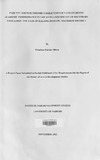| dc.description.abstract | The study investigated the relationship between parents' socio-economic characteristics and students' academic performance in Kenya Certificate of Secondary Education in Kalama Division, Machakos district. It covered students who sat for KCSE between 2000 and 2010. The study had five objectives. These were: to investigate the parents' socio-economic characteristics in Kalama division; to document the characteristics of secondary school students in Kalama division; to determine whether parent's socio-economic characteristics influences student's academic performance in KCSE; to investigate whether parental support to child's education differs on the basis of parent's socio-economic characteristics; and lastly to investigate whether student's academic performance in KCSE differs by the level of parental support to child's education.
The review of the literature focused on the role of parents in their children's education; and the influence of parents' socio-economic characteristics on students' academic performance. It provided guidelines and laid the background of the study. However, there was no consensus from literature on the kind of relationship that exists between parents' socioeconomic and students' academic performance. The study used an ex-post facto research design, and questionnaires and interview guides were used to collect data. Quantitative data were computed and analysed using the statistical package for Social Science (SPSS) while qualitative data were analysed using word tables, and presented in figures and tables, The study found that parents' level of education correlates with academic performance of students in KCSE. It also found that income and family size influence academic performance while family structure and parents' occupation do not. Parents with higher levels of e~ucation were found to have higher levels of family income, provided more support to their children's education, and had higher expectations on their children's education.
In turn, these led to better academic performance of their children. In addition, the level of parental support to child's education differed by family income with parents who had higher income supporting their children more than those with low income. However, parental support did not differ by parents' age, family structure and occupation. Based on the findings, the study recommends that parents should improve their education levels through adult education programmes. Second, school administration and other stakeholders through Parents-Teachers Association (PTA) and local meetings (barazas) should sensitize parents on their role in their children's education so that they don't put the blame entirely on teachers when their children don't perform w~l! in school. Third, parents need to be informed that they can contribute to the education of their children through their support of child's school activities at home and being actively involved in children's school life. Finally, for further research, the study should be replicated on a larger scale either in Kalama or any other area in Kenya and beyond in order to draw wider policy implications from it. | en_US |

